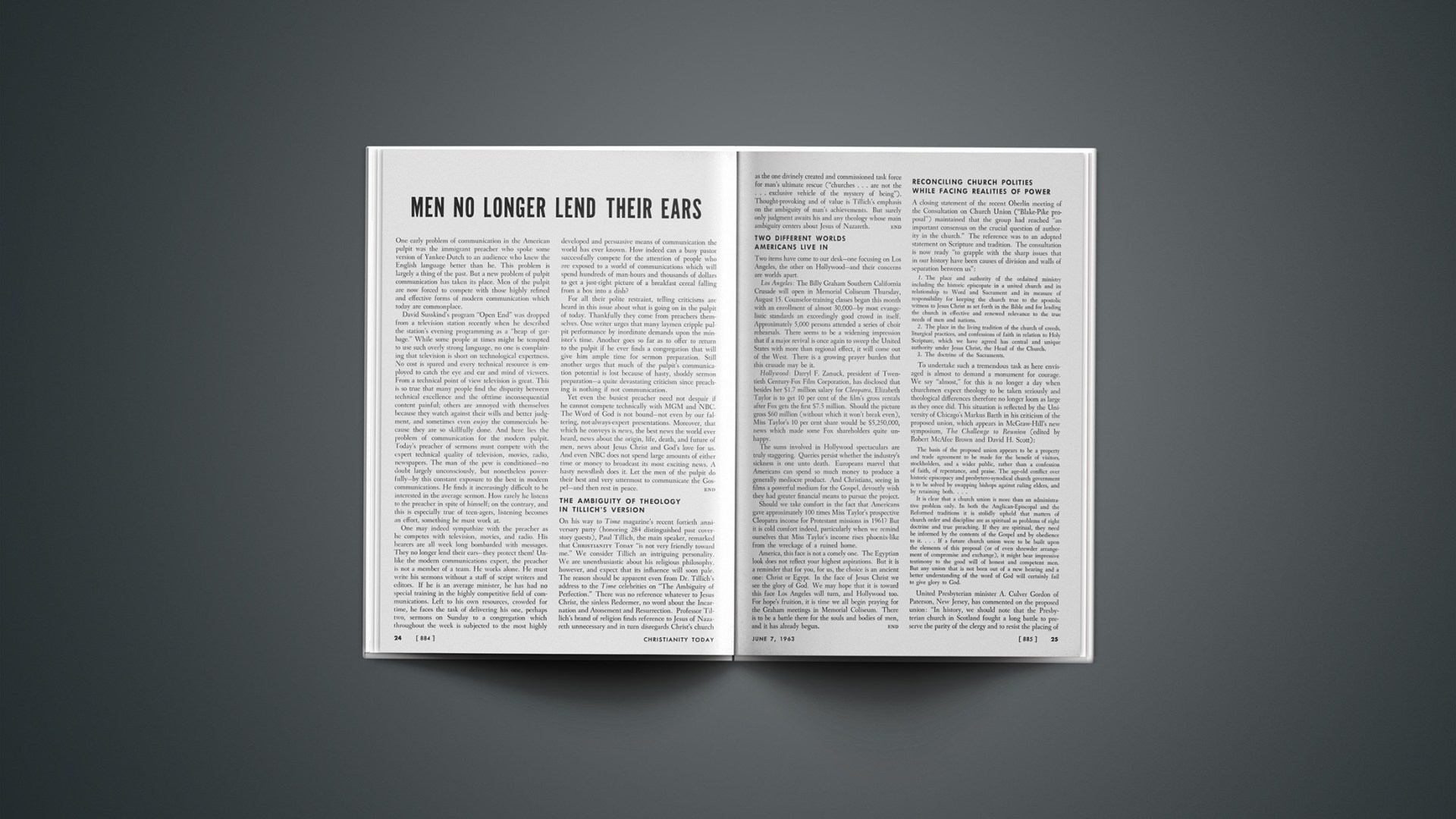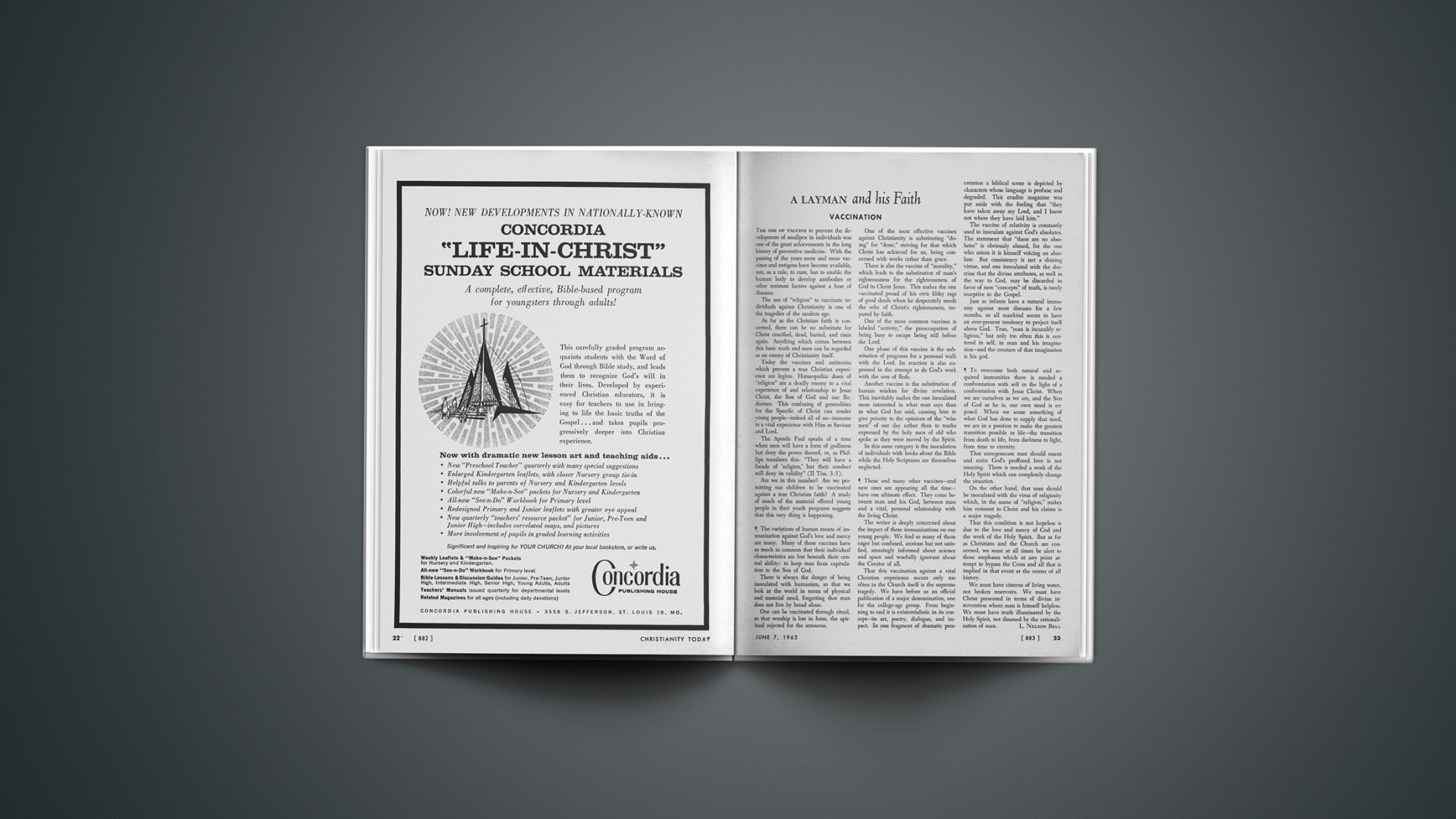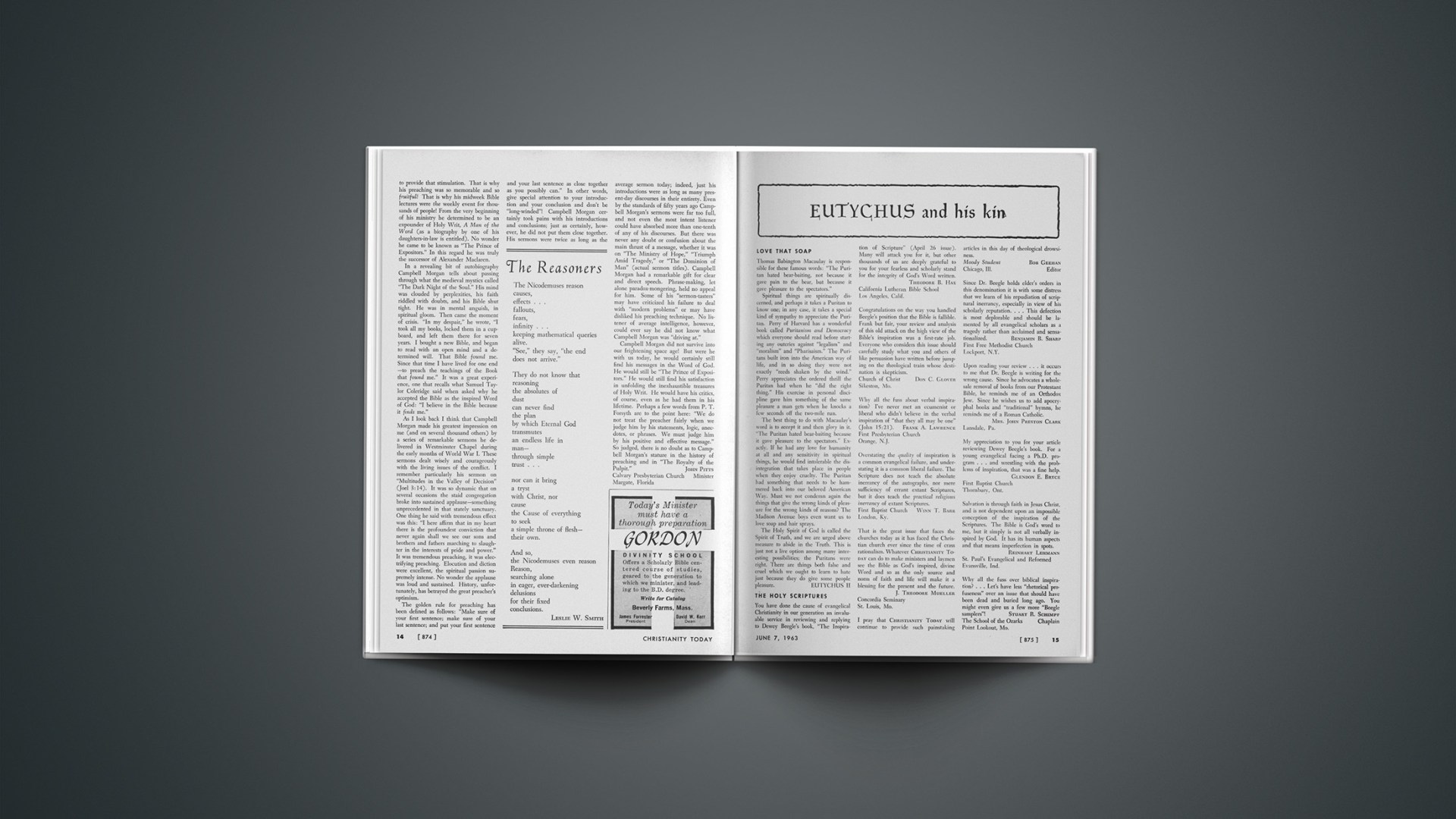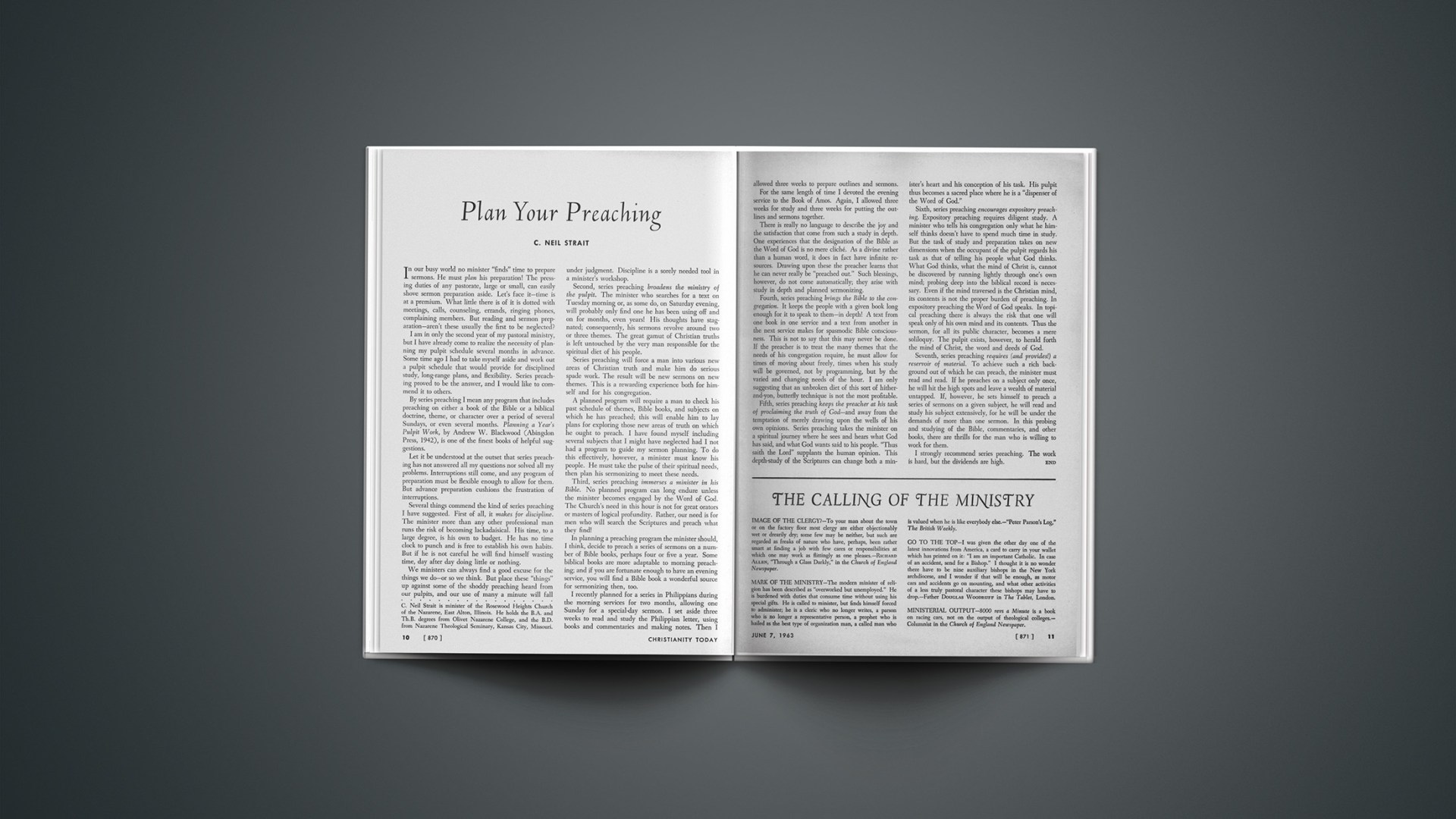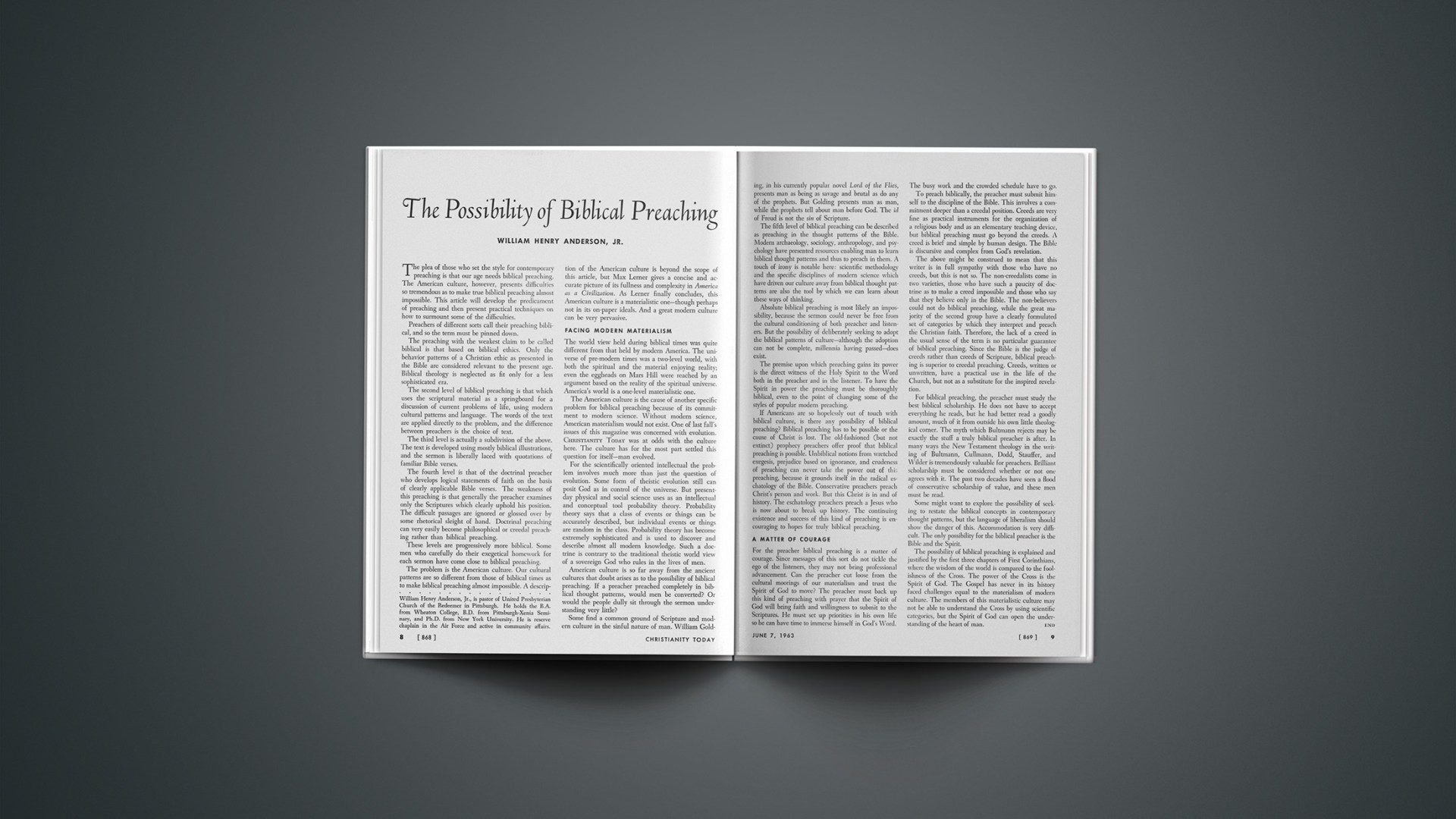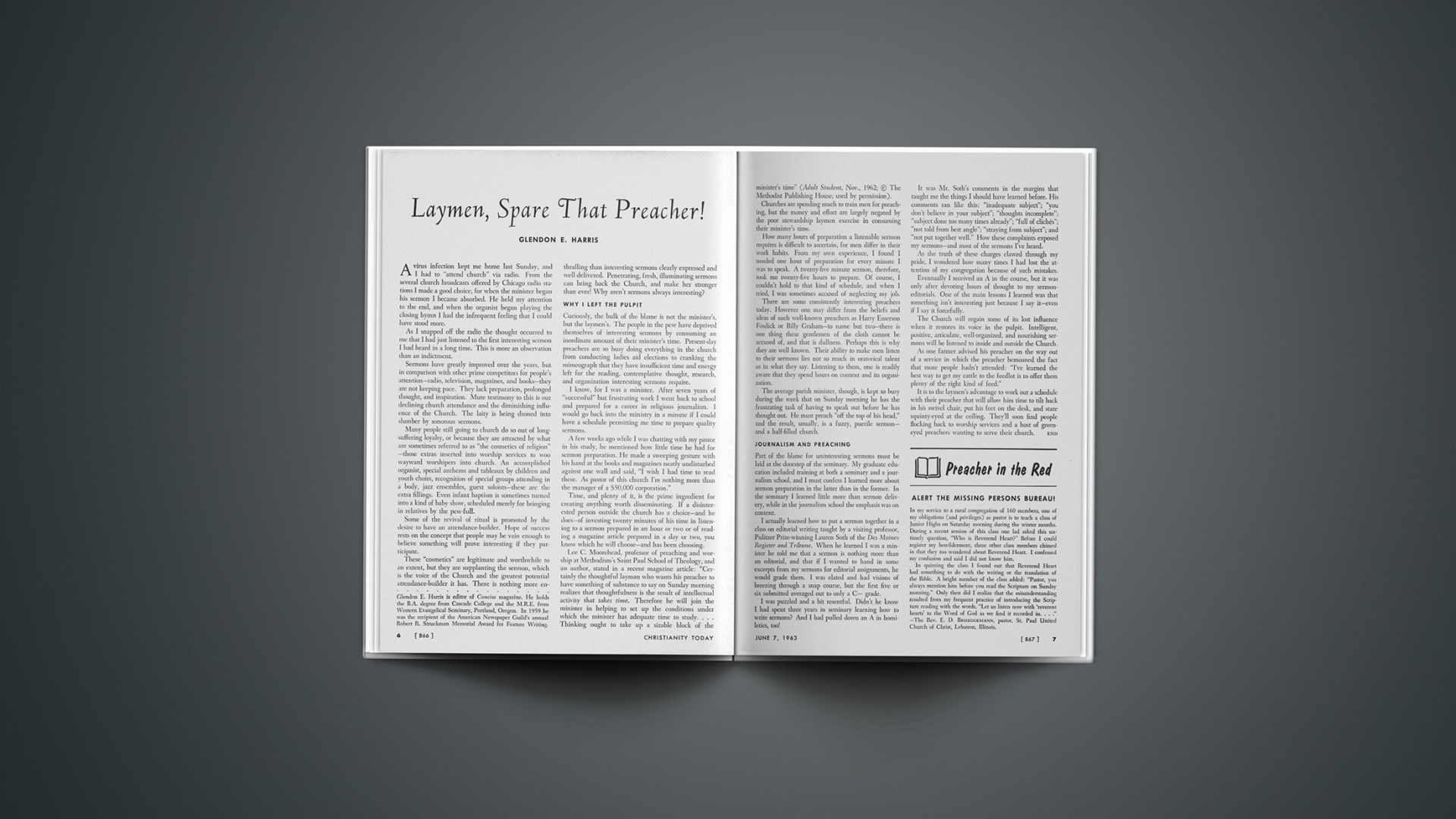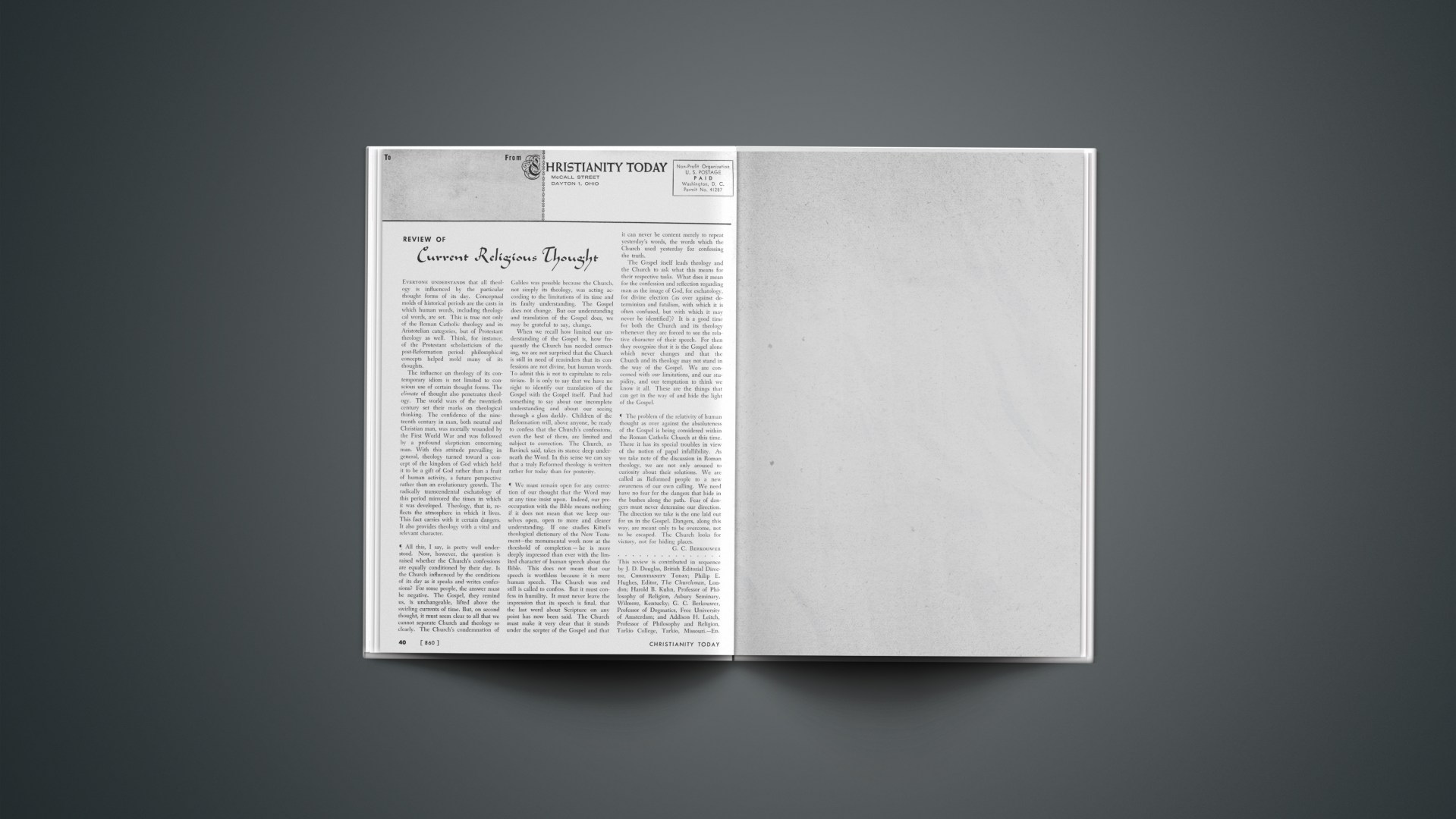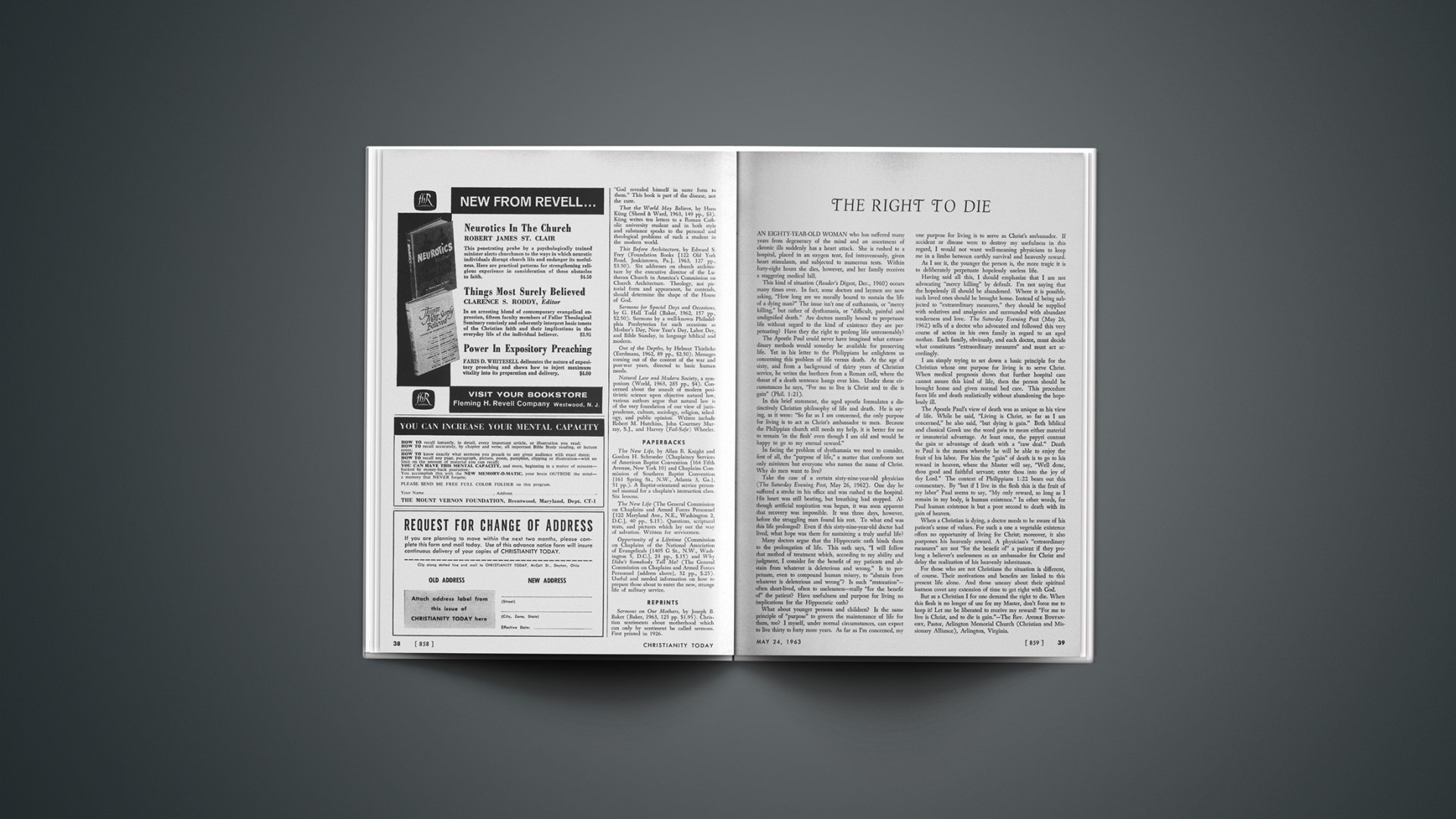One early problem of communication in the American pulpit was the immigrant preacher who spoke some version of Yankee-Dutch to an audience who knew the English language better than he. This problem is largely a thing of the past. But a new problem of pulpit communication has taken its place. Men of the pulpit are now forced to compete with those highly refined and effective forms of modern communication which today are commonplace.
David Susskind’s program “Open End” was dropped from a television station recently when he described the station’s evening programming as a “heap of garbage.” While some people at times might be tempted to use such overly strong language, no one is complaining that television is short on technological expertness. No cost is spared and every technical resource is employed to catch the eye and ear and mind of viewers. From a technical point of view television is great. This is so true that many people find the disparity between technical excellence and the ofttime inconsequential content painful; others are annoyed with themselves because they watch against their wills and better judgment, and sometimes even enjoy the commercials because they are so skillfully done. And here lies the problem of communication for the modern pulpit. Today’s preacher of sermons must compete with the expert technical quality of television, movies, radio, newspapers. The man of the pew is conditioned—no doubt largely unconsciously, but nonetheless powerfully—by this constant exposure to the best in modern communications. He finds it increasingly difficult to be interested in the average sermon. How rarely he listens to the preacher in spite of himself; on the contrary, and this is especially true of teen-agers, listening becomes an effort, something he must work at.
One may indeed sympathize with the preacher as he competes with television, movies, and radio. His hearers are all week long bombarded with messages. They no longer lend their ears—they protect them! Unlike the modern communications expert, the preacher is not a member of a team. He works alone. He must write his sermons without a staff of script writers and editors. If he is an average minister, he has had no special training in the highly competitive field of communications. Left to his own resources, crowded for time, he faces the task of delivering his one, perhaps two, sermons on Sunday to a congregation which throughout the week is subjected to the most highly developed and persuasive means of communication the world has ever known. How indeed can a busy pastor successfully compete for the attention of people who are exposed to a world of communications which will spend hundreds of man-hours and thousands of dollars to get a just-right picture of a breakfast cereal falling from a box into a dish?
For all their polite restraint, telling criticisms are heard in this issue about what is going on in the pulpit of today. Thankfully they come from preachers themselves. One writer urges that many laymen cripple pulpit performance by inordinate demands upon the minister’s time. Another goes so far as to offer to return to the pulpit if he ever finds a congregation that will give him ample time for sermon preparation. Still another urges that much of the pulpit’s communication potential is lost because of hasty, shoddy sermon preparation—a quite devastating criticism since preaching is nothing if not communication.
Yet even the busiest preacher need not despair if he cannot compete technically with MGM and NBC. The Word of God is not bound—not even by our faltering, not-always-expert presentations. Moreover, that which he conveys is news, the best news the world ever heard, news about the origin, life, death, and future of men, news about Jesus Christ and God’s love for us. And even NBC does not spend large amounts of either time or money to broadcast its most exciting news. A hasty newsflash does it. Let the men of the pulpit do their best and very uttermost to communicate the Gospel—and then rest in peace.
END
The Ambiguity Of Theology In Tillich’S Version
On his way to Time magazine’s recent fortieth anniversary party (honoring 284 distinguished past cover-story guests), Paul Tillich, the main speaker, remarked that CHRISTIANITY TODAY “is not very friendly toward me.” We consider Tillich an intriguing personality. We are unenthusiastic about his religious philosophy, however, and expect that its influence will soon pale. The reason should be apparent even from Dr. Tillich’s address to the Time celebrities on “The Ambiguity of Perfection.” There was no reference whatever to Jesus Christ, the sinless Redeemer, no word about the Incarnation and Atonement and Resurrection. Professor Tillich’s brand of religion finds reference to Jesus of Nazareth unnecessary and in turn disregards Christ’s church as the one divinely created and commissioned task force for man’s ultimate rescue (“churches … are not the … exclusive vehicle of the mystery of being”). Thought-provoking and of value is Tillich’s emphasis on the ambiguity of man’s achievements. But surely only judgment awaits his and any theology whose main ambiguity centers about Jesus of Nazareth.
END
Two Different Worlds Americans Live In
Two items have come to our desk—one focusing on Los Angeles, the other on Hollywood—and their concerns are worlds apart.
Los Angeles: The Billy Graham Southern California Crusade will open in Memorial Coliseum Thursday, August 15. Counselor-training classes began this month with an enrollment of almost 30,000—by most evangelistic standards an exceedingly good crowd in itself. Approximately 5,000 persons attended a series of choir rehearsals. There seems to be a widening impression that if a major revival is once again to sweep the United States with more than regional effect, it will come out of the West. There is a growing prayer burden that this crusade may be it.
Hollywood: Darryl F. Zanuck, president of Twentieth Century-Fox Film Corporation, has disclosed that besides her $1.7 million salary for Cleopatra, Elizabeth Taylor is to get 10 per cent of the film’s gross rentals after Fox gets the first $7.5 million. Should the picture gross $60 million (without which it won’t break even), Miss Taylor’s 10 per cent share would be $5,250,000, news which made some Fox shareholders quite unhappy.
The sums involved in Hollywood spectaculars are truly staggering. Queries persist whether the industry’s sickness is one unto death. Europeans marvel that Americans can spend so much money to produce a generally mediocre product. And Christians, seeing in films a powerful medium for the Gospel, devoutly wish they had greater financial means to pursue the project.
Should we take comfort in the fact that Americans gave approximately 100 times Miss Taylor’s prospective Cleopatra income for Protestant missions in 1961? But it is cold comfort indeed, particularly when we remind ourselves that Miss Taylor’s income rises phoenix-like from the wreckage of a ruined home.
America, this face is not a comely one. The Egyptian look does not reflect your highest aspirations. But it is a reminder that for you, for us, the choice is an ancient one: Christ or Egypt. In the face of Jesus Christ we see the glory of God. We may hope that it is toward this face Los Angeles will turn, and Hollywood too. For hope’s fruition, it is time we all begin praying for the Graham meetings in Memorial Coliseum. There is to be a battle there for the souls and bodies of men, and it has already begun.
END
Reconciling Church Polities While Facing Realities Of Power
A closing statement of the recent Oberlin meeting of the Consultation on Church Union (“Blake-Pike proposal”) maintained that the group had reached “an important consensus on the crucial question of authority in the church.” The reference was to an adopted statement on Scripture and tradition. The consultation is now ready “to grapple with the sharp issues that in our history have been causes of division and walls of separation between us”:
1. The place and authority of the ordained ministry including the historic episcopate in a united church and its relationship to Word and Sacrament and its measure of responsibility for keeping the church true to the apostolic witness to Jesus Christ as set forth in the Bible and for leading the church in effective and renewed relevance to the true needs of men and nations.
2. The place in the living tradition of the church of creeds, liturgical practices, and confessions of faith in relation to Holy Scripture, which we have agreed has central and unique authority under Jesus Christ, the Head of the Church.
3. The doctrine of the Sacraments.
To undertake such a tremendous task as here envisaged is almost to demand a monument for courage. We say “almost,” for this is no longer a day when churchmen expect theology to be taken seriously and theological differences therefore no longer loom as large as they once did. This situation is reflected by the University of Chicago’s Markus Barth in his criticism of the proposed union, which appears in McGraw-Hill’s new symposium, The Challenge to Reunion (edited by Robert McAfee Brown and David H. Scott):
The basis of the proposed union appears to be a property and trade agreement to be made for the benefit of visitors, stockholders, and a wider public, rather than a confession of faith, of repentance, and praise. The age-old conflict over historic episcopacy and presbytero-synodical church government is to be solved by swapping bishops against ruling elders, and by retaining both.…
It is clear that a church union is more than an administrative problem only. In both the Anglican-Episcopal and the Reformed traditions it is stolidly upheld that matters of church order and discipline are as spiritual as problems of right doctrine and true preaching. If they are spiritual, they need be informed by the contents of the Gospel and by obedience to it.… If a future church union were to be built upon the elements of this proposal (or of even shrewder arrangement of compromise and exchange), it might bear impressive testimony to the good will of honest and competent men. But any union that is not born out of a new hearing and a better understanding of the word of God will certainly fail to give glory to God.
United Presbyterian minister A. Culver Gordon of Paterson, New Jersey, has commented on the proposed union: “In history, we should note that the Presbyterian church in Scotland fought a long battle to preserve the parity of the clergy and to resist the placing of bishops over them. Are we willing to give away what they are willing to die for?” Some hark back to Calvinist-Arminian differences, among others, which are historically resident in the consulting churches.
On the other hand, in Oberlin the consultation voted to receive a report dealing with a sociological “Analysis of the Participating Communions,” which, delegates declared, “in its analysis of function” points to the possibility of combining in a united church episcopal, presbyterial, and congregational polities. Episcopalians were not too happy with this, even though they had succeeded in removing the term “historic episcopate” from the statement, for they did not believe the report pointed to the possibility of combining this with the other polities.
The report, written by Professor Paul M. Harrison of Princeton University’s religion department, was startlingly frank in distinguishing between legitimated authority and actual power in church government. On “religious establishments” it set forth the following hypotheses:
Given the disparate nature of authority and power in the participating communions it can be reasonably hypothesized that one of the most effective instruments for sustaining the denominations and formulating denominational polity is also one of the most difficult to define. In secular political literature it has been called “the establishment.” Rovere, in his perceptive and amusing article on the American Establishment, points out that experts disagree on what the Establishment is and how it works, but he further observes that the experts also disagree on the nature and operation of the Kingdom of God without denying its existence.
The Establishment appears to be a functional necessity in each of the denominations. The first order of business of every informal Establishment meeting is to deny the existence of the Establishment. The leaders of the Establishment maintain that real denominational power rests with the people, the local congregations, the regional officers, the national executives, the General Assembly, the General Council, or the Presiding Bishop.
The Establishment consists of businessmen and bishops, professional priests and professional laymen, ecclesiastical executives, and theologians of every persuasion, although the Fundamentalists will be sparsely represented. It consists largely of people from the Northeast. These are supported by a handful of affluent folks from the midwestern states, two or three big men from Dallas, and a generous helping from the Pacific Coast élite.
The Establishment, a very modest group in size, will hold the balance of power on most crucial issues irrespective of who holds the formal seat of authority. The group consists of an alliance of near-conservatives and almost-radicals who are cooperating in their common search for a non-irritating approach to controversial issues.
It is not exceedingly difficult to identify at least the principal members of the Establishment within a denomination. Any person who possesses an intimate knowledge of denominational politics can name at least a few members of the Establishment’s Executive Committee.
One effective way of determining who are some of the members of a denominational Establishment is to examine the lists of the American Ecumenical Establishment. A good start at discovering who these people are can be gained by culling the board members of the National Council of Churches.
The Establishment can marshall considerable positive support behind a policy which they favor, but they can generate even greater power to curtail what they describe as “idiotic non-Establishment deviations.” When the Establishment is divided by geographical, professional, or institutional interests, “idiocy” can and sometimes has prevailed. This was the case with the Fundamentalist Controversy which swept some of the denominations but was eventually bridled by Establishment powers.…
The Establishment does not work effectively at the state and local level. A seminary dean and his bishop, both of whom may be Charter Members of the Establishment, can lock in mortal combat at the diocesan level and at the same time be most congenial brothers on national issues.…
As in secular American politics there is an unwritten rule that the national powers do not violate the autonomy of diocesan or presbyterial affairs. This situation is gradually changing as denominational authority is increasingly centralized. Conversely, the local, non-Establishment bishop may exercise unquestioned authority in his diocese, but may be superceded at the national level by one of his laymen who is an Establishment Man.
Little wonder if the average churchman, when confronted with the face of political power in the church, questions the necessity for long, drawn-out wrangling over reconciliation of details of church polity.
END

